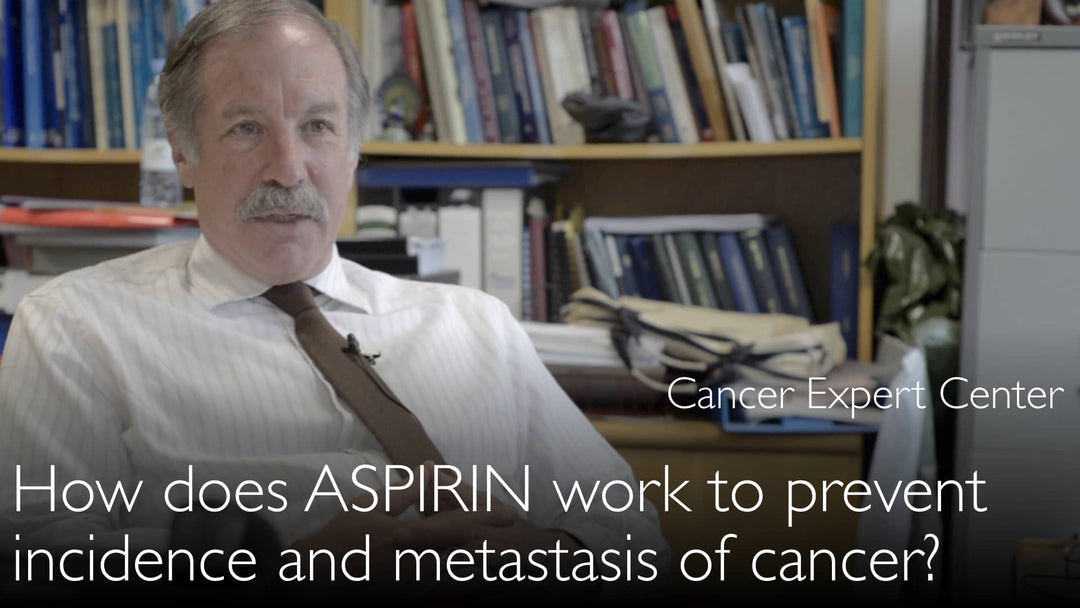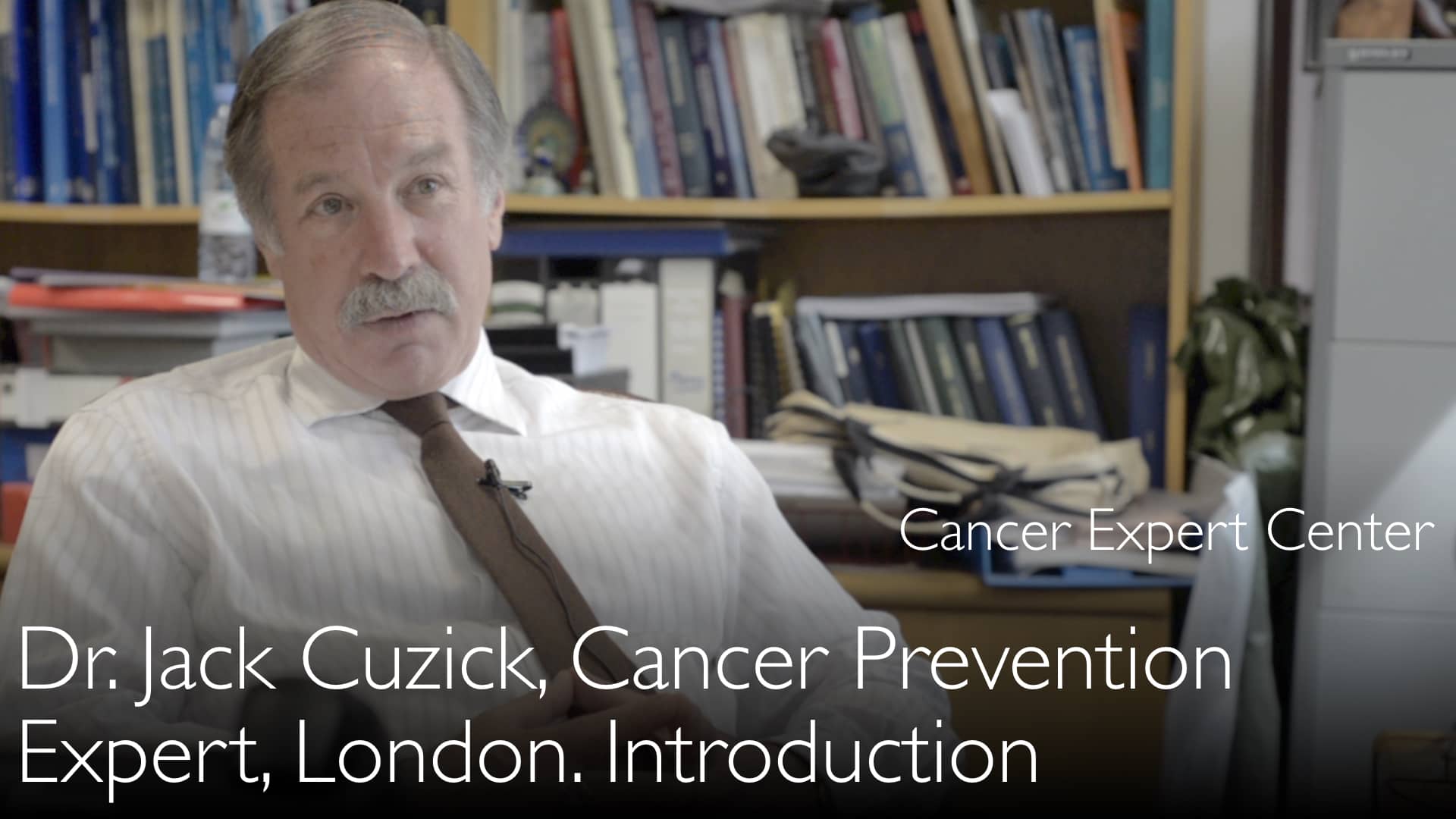Syövän ehkäisyn asiantuntijajohtaja, lääketieteen tohtori Jack Cuzick, selittää aspiriinin kaksoismekanismin syövän ilmaantuvuuden ja etäpesäkkeiden vähentämisessä. Hän korostaa lääkkeen merkittävää roolia suolisto-, rinta- ja eturauhassyöpien kuolleisuutta alentavassa vaikutuksessa, joka toteutuu verihiutaleiden eston ja muiden, vielä täysin selvittämättömien monimutkaisten reittien kautta.
Aspiriini syövän ehkäisyssä ja etäpesäkkeiden ehkäisyssä: mekanismit ja kliininen näyttö
Hyppää osioon
- Aspiriinin syöpäehkäisyhyödyt
- Tulehdus ja COX-2-mekanismi
- Verihiutaleiden aggregaation estäminen
- Verihiutaleiden chaperonointi ja metastasi
- Kliiniset tutkimukset ja kuolleisuusdata
- Kaksoismekanismihypoteesi
- Tulevat tutkimussuunnat
Aspiriinin syöpäehkäisyhyödyt
Lääketieteen tohtori Jack Cuzickin mukaan aspiriinin käyttöön liittyy dramaattinen riskin väheneminen useiden ruoansulatuskanavan syöpien osalta. Empiirisen aineiston perusteella säännöllinen aspiriinin käyttö voi vähentää paksu- ja peräsuolen syövän, ruokatorven syövän ja mahasyövän riskiä jopa 30 prosentilla. Tämä tekee aspiriinista merkittävän lääkeaineen syövän kemopreventiossa.
Tulehdus ja COX-2-mekanismi
Tulehdus on tunnettu riskitekijä syövän kehittymiselle, ja aspiriini on tunnettu tulehduskipulääke. Lääketieteen tohtori Jack Cuzickin mukaan sen ensisijainen tulehdusta estävä mekanismi liittyy COX-2-entsyymin estoon. Tämä vaikutus vaatii kuitenkin suhteellisen korkean vähimmäisannoksen, noin 600 milligrammaa päivässä, jotta COX-2-tuotanto saadaan tehokkaasti tukahdutettua. Koska syöpäehkäisyhyödyt ilmenevät huomattavasti pienemmillä annoksilla, tohtori Cuzickin mukaan COX-2-esto ei ole aspiriinin syöpää vastaan taistelevien vaikutusten päämekanismi, mikä viittaa monimutkaisempiin selitysmalleihin.
Verihiutaleiden aggregaation estäminen
Matala-annoksen aspiriinin ensisijainen etu sydän- ja verisuonitaudeissa perustuu sen kykyyn estää verihiutaleiden tarttumista toisiinsa, eli verihiutaleiden aggregaatiota. Lääketieteen tohtori Jack Cuzickin mukaan tieteellisessä yhteisössä vallitsee vahva näkemys, että tämä verihiutaleiden toimintaa estävä ominaisuus on ratkaisevan tärkeä myös syöpäehkäisyssä. Jopa matalat aspiriiniannokset voivat vaikuttaa verihiutaleiden sisällä olevaan COX-1:een, mikä voi osaltaan vähentää tulehdusta, vaikka tarkkaa reittiä ei vielä täysin ymmärretä.
Verihiutaleiden chaperonointi ja metastasi
Matala-annoksen aspiriinille saattaa olla vielä tärkeämpi mekanismi sen roolissa syövän etäpesäkkeiden ehkäisyssä. Tohtori Cuzickin kuvailemana verihiutaleet voivat toimia chaperoneina verenkierrossa liikkuville syöpäsoluille. Ne voivat kietoutua syöpäsolujen ympärille muodostaen suojaisia ”teltoja”, jotka suojaavat syöpäsoluja immuunijärjestelmältä ja mahdollistavat etäpesäkkeiden muodostumisen. Estämällä verihiutaleiden aggregaation aspiriini häiritsee tätä chaperonointiprosessia. Lääketieteen tohtori Jack Cuzickin mukaan tämä antimetastaattinen vaikutus saattaa olla keskeinen syy siihen, miksi aspiriini vähentää syöpäkuolleisuutta.
Kliiniset tutkimukset ja kuolleisuusdata
Vankka kliininen näyttö tukee aspiriinin käyttöä potilailla, joilla on saatu syöpädiagnoosi. Lääketieteen tohtori Jack Cuzick viittaa kliinisiin tutkimuksiin, joissa on havaittu syöpätautien uusiutumisasteiden laskua ja vielä tärkeämmin kuolleisuuden vähenemistä potilailla, jotka käyttävät aspiriinia. Tämä on havaittu sekä paksu- ja peräsuolen syövässä että rintasyövässä. Epidemiologinen aineisto osoittaa johdonmukaisesti, että aspiriinin vaikutus syöpäkuolleisuuteen on usein hieman suurempi kuin sen vaikutus syöpäilmaantuvuuteen, mikä vahvistaa antimetastaasihypoteesia.
Kaksoismekanismihypoteesi
Saatavissa olevaan näyttöön perustuen tohtori Cuzick esittää kaksoismekanismihypoteesin aspiriinin toiminnasta syöpää vastaan. Hänen mukaansa yksi mekanismi vastaa syövän alkukehityksen estämisestä, kun taas toinen, erillinen mekanismi estää jo kehittyneen syövän leviämisen ja etäpesäkkeiden muodostumisen. Tämä selittäisi, miksi aspiriini on tehokas sekä ensisijaisessa ehkäisyssä että diagnoosin jälkeisen eloonjäämisen parantamisessa.
Tulevat tutkimussuunnat
Lääketieteen tohtori Jack Cuzick korostaa, että empiirinen aineisto aspiriinin hyödyistä on paljon edellä mekanistista ymmärrystä. Hänen mukaansa ei ole viisasta väittää, että ymmärrämme täysin, kuinka aspiriini vähentää syöpäriskiä ja kuolleisuutta. Tämä alue on keskeinen kohde tuleville perustieteen tutkimuksille, mikä on ratkaisevan tärkeää sen käytön optimoimiseksi kliinisessä käytännössä ja mahdollisesti kohdennettujen hoitomuotojen kehittämiseksi sen vaikutusmekanismien perusteella.
Koko transkriptio
Lääketieteen tohtori Anton Titov: Mitä tiedetään aspiriinin vaikutusmekanismeista syövän ehkäisyssä? Koska dramaattisia vaikutuksia on havaittu.
Lääketieteen tohtori Jack Cuzick: Aspiriini voi vähentää paksu- ja peräsuolen syövän, ruokatorven syövän ja mahasyövän riskiä jopa 30 prosentilla. Tämä on alue, josta meidän tulisi tietää paljon enemmän. Aspiriinin käyttö syöpäehkäisyyn on erittäin tärkeää. Sen tulisi olla keskeinen painopiste perustieteelliselle tutkimukselle.
Tämä johtopäätös on vakiintunut. Tulehdus on selvä riskitekijä syölle. Aspiriini estää tulehdusta. Aspiriini estää COX-2-entsyymiä. Mutta tämä vaikutus vaatii noin 600 milligramman annoksen päivässä vähintään. Tämä on annos, joka tarvitaan COX-2-tuotannon tehokkaaseen tukahduttamiseen. Siten aspiriinin aiheuttama COX-2-esto ei ole mekanismi syöpäehkäisyssä. Tarvitsemme monimutkaisemman selityksen.
Lääketieteen tohtori Anton Titov: Matala-annoksen aspiriinilla on ensisijaisesti osoitettu olevan vaikutus verihiutaleiden aggregaatioon.
Lääketieteen tohtori Jack Cuzick: Aspiriini estää verihiutaleita tarttumasta toisiinsa. Se on aspiriinin ensisijainen etu sydän- ja verisuonitaudeissa. On olemassa näkemys, että aspiriinin syöpää estävällä vaikutuksella on jotain tekemistä verihiutaleiden kanssa.
On olemassa kliinisiä tutkimuksia, jotka osoittavat, että jopa matalat aspiriiniannokset voivat vaikuttaa verihiutaleiden COX-1:een. Matala-annoksen aspiriini voi vähentää tulehdusta. Mutta se ei ole niin selvä. Sitä ei ymmärretä kovin hyvin.
Toinen mekanismi saattaa olla tärkeämpi sille, kuinka matala-annoksen aspiriini hidastaa syöpää. Se on tärkeämpää etäpesäkkeiden ja kuolleisuuden ehkäisyssä. On osoitettu, että verihiutaleet pystyvät chaperonoimaan syöpäsoluja. Verihiutaleet kietoutuvat verenkierrossa olevien syöpäsolujen ympärille.
Tämä johtaa siihen, että syöpäsolut voivat välttää immuunijärjestelmän. Syövän metastsaattiset solut voivat sitten kulkeutua kehossa. Tämä aiheuttaa etäpesäkkeitä. Verihiutaleet luovat pieniä telttia syöpäsolujen ympärille.
Mutta aspiriini estää verihiutaleita tarttumasta toisiinsa. Aspiriini estää verihiutaleiden kyvyn tarttua toisiinsa. Joten se saattaa olla selitys. Mutta se saattaa olla tärkeämpää aspiriinin antimetastaattiselle ominaisuudelle.
Verihiutaleiden aggregaation estäminen saattaa olla vähemmän tärkeää aspiriinin aiheuttamalle syöpäilmaantuvuuden vähenemiselle. Joten meillä on paljon opittavaa siellä. Minusta olisi viisasta sanoa, että emme ymmärrä mekanismia täysin. Kuinka aspiriini vähentää syöpää.
Se on alue, jossa empiirinen data on paljon edellä mekanistista ymmärrystä.
Lääketieteen tohtori Anton Titov: Se on myös mielenkiintoista. Mainitset, että aspiriini saattaa estää kasvainten solujen metastsaattista potentiaalia. Eturauhassyövässä on joitakin tietoja aspiriinin roolista ehkäisyssä.
Aspiriini vähentää kuolleisuutta paksu- ja peräsuolen syövästä syöpädiagnoosin jälkeen. Aspiriini vähentää kuolleisuutta rintasyövässä. On useita kliinisiä tutkimuksia, jotka ovat tarkastelleet aspiriinin käyttöä potilailla, joilla on jo syöpä. Ne havaitsivat syövän uusiutumisasteiden laskun.
Lääketieteen tohtori Jack Cuzick: Kliiniset tutkimukset havaitsivat kuolleisuuden laskun, jos potilaat käyttivät aspiriinia syöpädiagnoosin jälkeen. Joten siitä on näyttöä. On myös epäsuoraa näyttöä monista epidemiologisista kliinisistä tutkimuksista.
Aspiriinin vaikutus syöpäkuolleisuuteen on tyypillisesti hieman suurempi kuin vaikutus syöpäilmaantuvuuteen.
Lääketieteen tohtori Anton Titov: Joten se kaikki pysyy koossa. Se on jotain aivan todellista. Ehkä aspiriini auttaa vähentämään kasvainten solujen metastsaattista potentiaalia ja aggressiivisuutta.
Lääketieteen tohtori Jack Cuzick: Se on totta. Arvelen, että on vähintään kaksi mekanismia. On yksi mekanismi, kuinka aspiriini estää syövän kehittymisen. On myös toinen mekanismi. Emme ymmärrä sitä hyvin. Tämä aspiriinin lisämekanismi estää jo kehittyneen syövän leviämisen.





